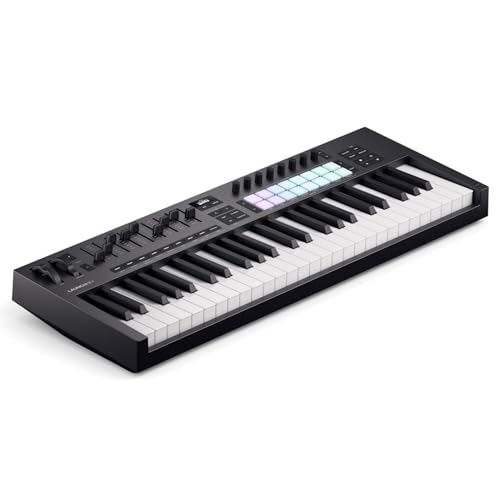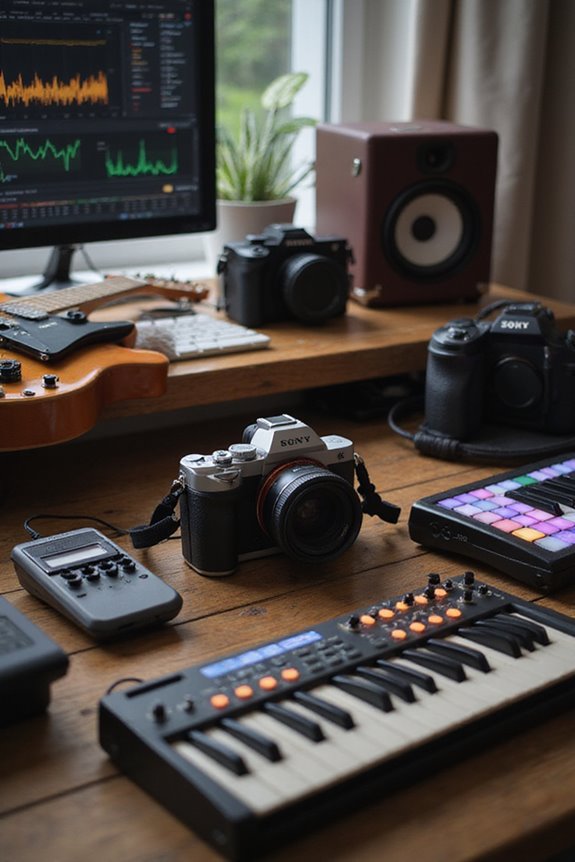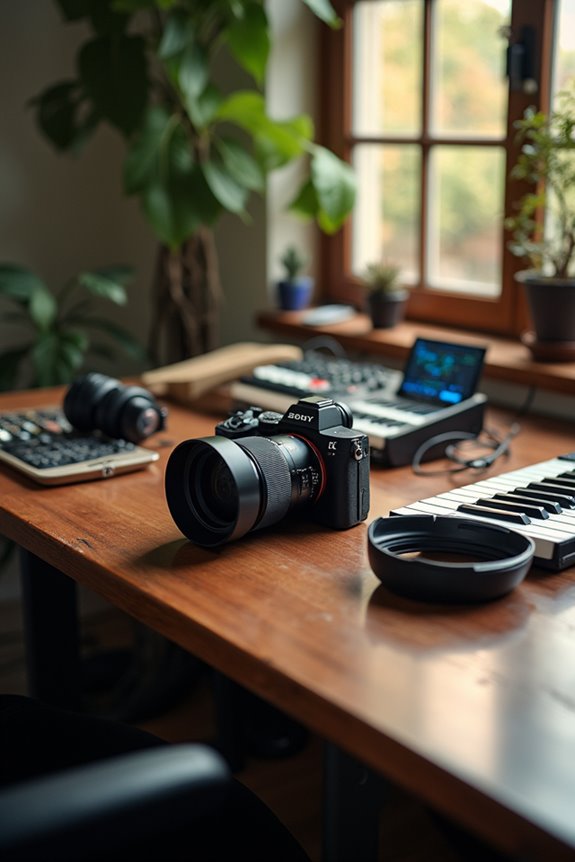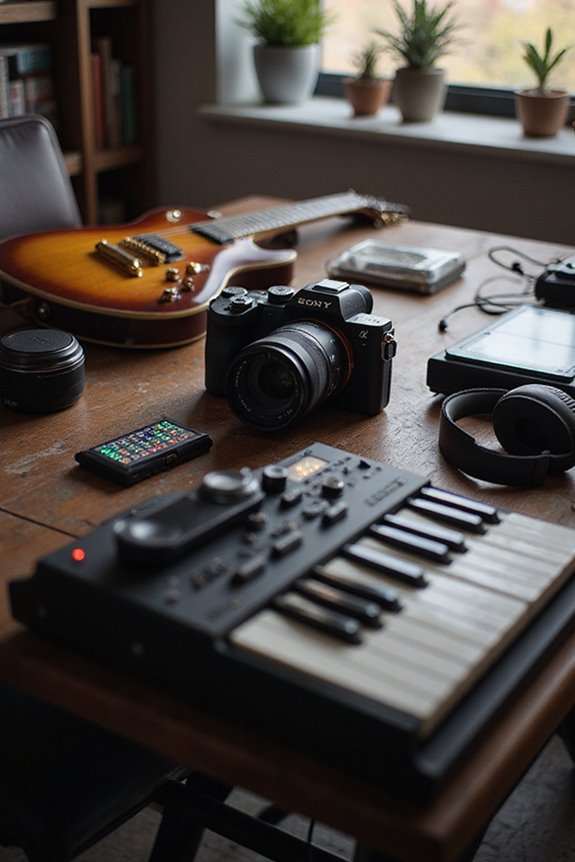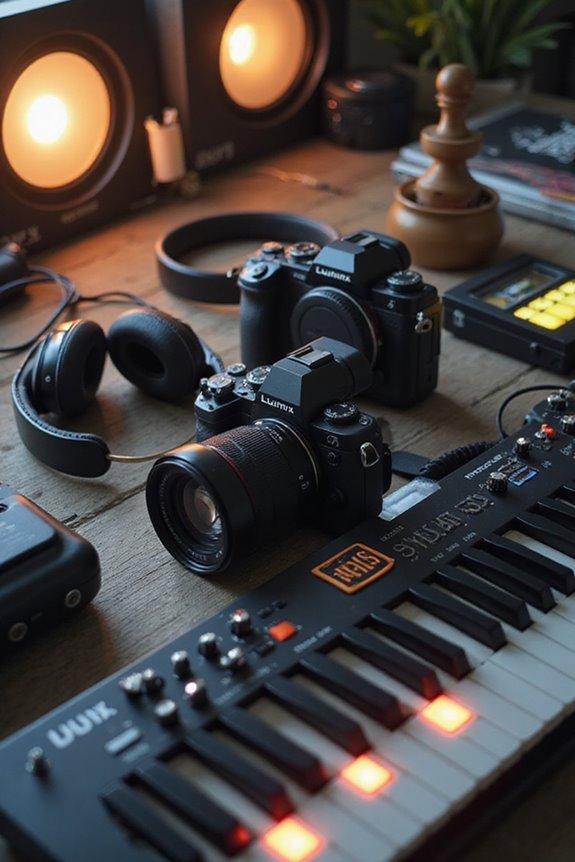As an Amazon Associate, we earn from qualifying purchases. Some links may be affiliate links at no extra cost to you. Although our opinions are based on curated research, we haven't used these products. Articles generated with AI.
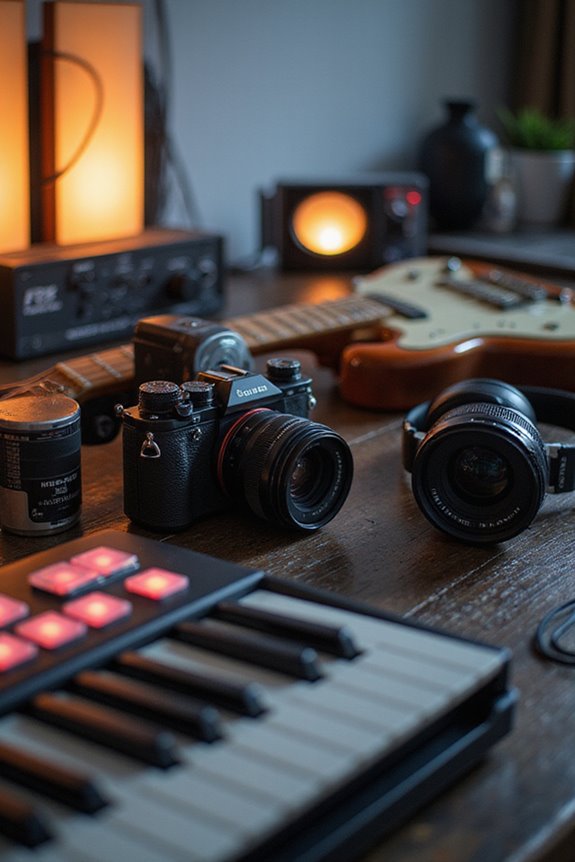
5 Best 49-Key MIDI Keyboard Controllers of 2025 – Features, Reviews & Top Picks
If you’re searching for the best 49-key MIDI keyboard controllers of 2025, you’ll want to contemplate options like the Novation Launchkey 49 MK4, known for its semi-weighted keys and intuitive integration with major DAWs. The M-AUDIO Oxygen MKV offers velocity-sensitive keys and extensive software support, while Arturia’s KeyLab Essential mk3 shines with its lightweight design and RGB pads. Each model enhances your music production experience, and there are even more insights and comparisons waiting for you.
Key Takeaways
- The Novation Launchkey 49 MK4 features semi-weighted keys and integrates well with major DAWs, enhancing musical expression and creativity.
- M-AUDIO Oxygen MKV offers velocity-sensitive keys and extensive customizable controls, making it suitable for both beginners and experienced producers.
- Arturia KeyLab Essential mk3 combines lightweight design with advanced features like Scale Mode and includes Analog Lab V software with vast presets.
- The Novation FLkey 49 provides seamless integration with FL Studio, though its stiffer keys may affect traditional piano playability.
- All models emphasize velocity-sensitive keys and include robust control features, enhancing the overall music production experience.
Novation FLkey 49 MIDI Keyboard for Music Production
Novation FLkey 49 MIDI Keyboard - Seamless FL Studio Integration with Chord Mode and Scale Mode. All...
- FLkey 49 — the full-sized MIDI keyboard controller for hands-on music production in FL Studio. No need to assign controls manually; FLkey integrates seamlessly
- Bring FL Studio’s Mixer and Channel Rack controls off the screen, into your hands – use the eight pots and nine faders to tweak your volumes or pans and record...
- Stay in the flow, no mouse needed; essential buttons give you access to your transport and score log, and you can undo, redo, quantise, and trigger metronome instantly
If you’re a dedicated FL Studio user looking to streamline your music production process, the Novation FLkey 49 MIDI Keyboard is an excellent choice. This full-sized MIDI controller integrates seamlessly with FL Studio, eliminating the need for manual control assignments. You’ll find controls for the Mixer, Channel Rack, and Sequencer at your fingertips, making adjustments effortless.
Eight pots and nine faders offer precise volume and pan control, while essential transport buttons keep your workflow smooth. The Sequencer Mode and Scale Mode help you create beats and melodies intuitively, ensuring your creativity flows without interruption.
Best For: FL Studio users looking for a MIDI keyboard that enhances workflow and creativity in music production.
Pros:
- Seamless integration with FL Studio, allowing for effortless control without manual assignments.
- User-friendly design featuring essential controls for quick adjustments and workflow efficiency.
- Versatile features such as Sequencer Mode and Scale Mode for intuitive beat and melody creation.
Cons:
- Some users find the keys stiffer compared to traditional piano keys, which may affect playability.
- Minor stability issues reported with MIDI connection at times.
- Larger size may be less portable compared to smaller MIDI controllers.
MIDI Keyboard Controller with 25 Keys and Drum Pads
OYAYO MIDI Keyboard Controller, 25 Key Rechargeable MIDI Keyboard with 8 Backlit Drum Pads, 8 Knobs,...
- 【Portable Bluetooth MIDI Keyboard】The 25 key MIDI keyboard support to USB or BT MIDI to transmit MIDI data, equipped rechargeable battery, easily slip this portable...
- 【Intelligent Automatic Accompaniment】Professional dynamic keyboard you can play essential bass lines, melodies, and leads with ease thanks to intelligent dynamic...
- 【Rich Function】 The USB MIDI controller can turn on or off 25 velocity-sensitive keys, 8 RGB backlit velocity-sensitive pads, 8 assignable rotary encoders, knob pitch...
The OYAYO MIDI Keyboard Controller stands out as an exceptional choice for beginners enthusiastic to plunge into music production. With 25 velocity-sensitive keys and 8 RGB backlit drum pads, it’s perfect for creating dynamic beats. Weighing just 2.38 pounds and measuring 13.6 x 7 x 2 inches, its portability makes it ideal for composing in various spaces, from studios to cafés.
It integrates seamlessly with popular DAWs like Ableton Live and GarageBand, allowing you to explore creative possibilities. Plus, the rechargeable battery enables on-the-go use, bringing music production to life wherever inspiration strikes.
Best For: This MIDI Keyboard Controller is best for beginners in music production and young aspiring artists looking to create music in various settings.
Pros:
- Lightweight and portable design ideal for on-the-go music creation.
- Seamless integration with popular DAWs, enhancing creative possibilities.
- Rechargeable battery allows for use in diverse locations without being tethered to an outlet.
Cons:
- Drum pads may require hard hits for optimal performance.
- Some connectivity issues reported with certain DAWs.
- Instructions provided may lack clarity for new users.
Novation Launchkey 49 MK4 MIDI Keyboard Controller
Novation Launchkey 49 MK4 – 49 key Semi-Weighted, USB, MIDI Keyboard Controller with DAW...
- The Creative Controller: Launchkey is an all-in-one DAW controller with premium keybeds and 16 responsive FSR pads for drumming, clip launching, and more
- Seamless DAW Integration: Launchkey works with all major DAWs, offering intuitive workflows for Ableton Live, Logic, Cubase, Reason, Reaper, FL Studio, and Ardour
- Go Beyond Finger Drumming: Launchkey’s FSR drum pads with polyphonic aftertouch also serve as step sequencers, clip launchers, chord triggers, and more
For musicians seeking a versatile and user-friendly MIDI controller, the Novation Launchkey 49 MK4 stands out as an excellent choice. With 49 semi-weighted keys that enhance musical expression, you’ll enjoy features like Chord and Scale Modes which allow for creative freedom during compositions. The eight drum pads and built-in arpeggiator seamlessly integrate with major DAWs, including Ableton Live and Logic. Though some users encountered minor setup complexities, the quality and value are widely praised. Plus, with a solid software bundle, it’s perfect for both newbies and seasoned producers aiming to elevate their sound.
Best For: Musicians and producers looking for a versatile and user-friendly MIDI controller to enhance their music production experience.
Pros:
- High-quality semi-weighted keys that improve musical expression.
- Seamless integration with major DAWs, making it suitable for a wide range of users.
- Comes with a solid software bundle, including Ableton Live Lite and several instrument/effect options.
Cons:
- Some users report minor sensitivity issues with the black keys.
- Bundled software requires multiple accounts and permissions, raising privacy concerns.
- Integration challenges with less popular DAWs may be frustrating for some users.
M-AUDIO Oxygen MKV 49 Key USB MIDI Keyboard Controller
M-AUDIO Oxygen 49 (MKV) Key USB MIDI Keyboard Controller with Beat Pads, Smart Chord, Scale Modes,...
- Recording Studio Equipment Essential - MIDI controller with 49 velocity-sensitive full-size piano style keys delivers a natural response that gets the best from virtual...
- Native Kontrol Standard (NKS) Integration - M-AUDIO and Native Instruments have partnered to bring NKS support to the Oxygen series, get ready to Kontrol straight from...
- Choose Your Exclusive Complimentary NKS Bundle - Browse and control Native Instruments presets and sound libraries; select one of three curated Komplete 15 Select...
Discover the M-AUDIO Oxygen MKV 49 Key USB MIDI Keyboard Controller, designed especially for music production enthusiasts looking for an accessible yet feature-rich tool. You’ll appreciate its 49 velocity-sensitive keys, providing a natural feel while playing virtual instruments. The controller includes eight backlit drum pads for beat production and intuitive control over your DAW, thanks to assignable knobs and faders.
With included software like MPC Beats and Ableton Live Lite, you’ll have everything you need to kickstart your music projects. Overall, it’s a practical choice for beginners seeking versatility and ease of use in their setups.
Best For: Beginners and music production enthusiasts looking for an affordable, feature-rich MIDI keyboard controller.
Pros:
- Excellent build quality and key feel, enhancing the playing experience.
- Extensive software package included, offering tools for music production right out of the box.
- User-friendly setup with seamless integration with various DAWs, making it easy for beginners to get started.
Cons:
- Some users report compatibility issues with specific DAWs, which may require technical adjustments.
- Occasional software update problems have led to negative experiences for some users.
- Limited advanced features that may not satisfy more experienced users looking for professional-grade equipment.
Arturia KeyLab Essential mk3 49 Key USB MIDI Keyboard Controller
Arturia KeyLab Essential mk3 — 49 Key USB MIDI Keyboard Controller with Analog Lab V Software...
- New creative features: Scale Mode, Chord Mode, and Arpeggiator, making composition, songwriting, and beat-making more intuitive than ever.
- Custom DAW integration: KeyLab Essential 3 features custom scripts for deeper control over DAWs, including Ableton Live Logic Pro X, FL Studio, and more.
- More versatile presets: The 2000 presets included with Analog Lab V are no longer limited to vintage sounds; users can enjoy unique hybrids, modern synths, orchestral...
Arturia’s KeyLab Essential mk3 49 Key USB MIDI Keyboard Controller stands out as an excellent choice for both beginners and seasoned musicians seeking an intuitive and versatile performance tool. Weighing just 6.07 pounds, it’s easy to transport, making it perfect for gigging. With features like Scale Mode, Chord Mode, and an Arpeggiator, you can unleash your creativity effortlessly.
Moreover, the RGB-backlit pads provide feedback with pressure sensitivity for dynamic playing. The included Analog Lab V software offers 2000 presets, ensuring you have a rich palette of sounds at your fingertips. Overall, it’s ideal for seamless integration with software like Ableton Live.
Best For: Musicians of all skill levels who seek a lightweight and versatile MIDI keyboard for both studio and live performance applications.
Pros:
- Excellent integration with popular DAWs, allowing for smooth workflows.
- Lightweight and portable design makes it easy to transport for gigs.
- A rich selection of sounds with 2000 presets available through Analog Lab V.
Cons:
- Initial software setup can be challenging for some users.
- Limited standalone features may require reliance on additional software.
- The 49-key design may be restrictive for those who prefer a larger keyboard.
Factors to Consider When Choosing a 49 Key Midi Keyboard Controller
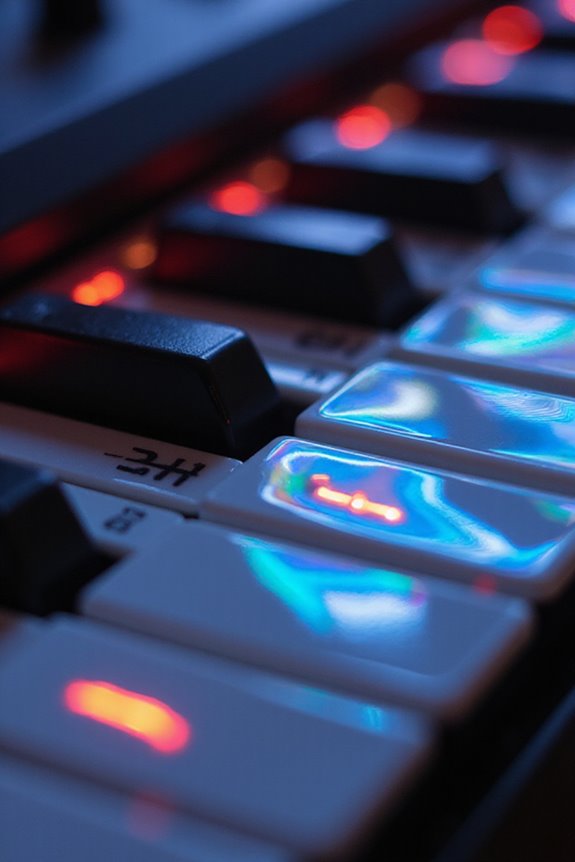
When choosing a 49-key MIDI keyboard controller, you’ll want to evaluate several important factors. First, think about the key action type, as it affects your playing feel and style. Additionally, check for compatibility with your DAW, build quality, control features, and portability to guarantee you pick the right controller for your needs.
Key Action Type
Choosing the right key action type for your 49-key MIDI keyboard controller can greatly enhance your music-making experience. Key action greatly influences how you interact with your instrument. There are three main types: unweighted, semi-weighted, and fully weighted.
If you need quick note entry for electronic music, unweighted keys are ideal; they’re light and springy. For more depth, semi-weighted keys offer a balance, providing some resistance while still being responsive. Pianists often prefer fully weighted keys for their realistic touch, which can enrich expressive techniques like dynamics and articulation.
Additionally, look for velocity-sensitive keys, as they vary sound output based on your touch, sharpening your musical expressiveness and overall performance. Make your choice wisely!
DAW Compatibility
How well does your 49-key MIDI keyboard integrate with your preferred digital audio workstation (DAW)? This compatibility is essential for a smooth workflow. Look for keyboards with native integration for popular DAWs like Ableton Live, FL Studio, or Logic Pro X. They streamline setup and minimize configuration time, allowing you to focus on creativity.
Auto-mapping features are game-changers, automatically assigning controls to their respective parameters, boosting your productivity considerably. Verify the keyboard supports multiple operating systems, like Windows and macOS, so you can seamlessly switch devices without hassle. Don’t forget to check for DAW-specific scripts or customizable settings that enhance your music production experience, granting you better control over your projects.
Build Quality
The build quality of your 49-key MIDI keyboard controller plays an essential role in its overall performance and longevity. Models crafted from metal tend to offer greater durability, while plastic alternatives may be lighter but less sturdy. A heavier model—around 9 pounds—provides stability during performance, whereas lighter ones (6 to 7 pounds) enhance portability. Pay attention to the feel of the keys; semi-weighted options cater to different playing styles and comfort preferences. Quality drum pads and knobs should feel responsive, as this improves your workflow during music production. Additionally, ensuring robust connections, such as USB and MIDI ports, is vital for seamless integration with various devices, preventing frustrating connectivity issues.
Control Features
When steering the selection of a 49-key MIDI keyboard controller, consider the control features that can greatly enhance your music production experience. Look for keyboards with assignable knobs and faders for robust control over your DAW and virtual instruments. Velocity-sensitive drum pads are essential for dynamic beat production, mimicking the feel of acoustic drumming.
Additionally, creative modes like Smart Chord and Arpeggiator can simplify complex techniques, inspiring your musical creativity. Guarantee seamless DAW integration for automatic control mapping, saving you time on setup. Other valuable features include pitch and modulation wheels, transport controls, and dedicated buttons for recording or playing, all of which streamline your music-making process and keep your workflow efficient.
Portability Options
Portability plays a significant role in the selection process for a 49-key MIDI keyboard controller. Look for a lightweight model under 7 pounds; this makes transport easier for on-the-go music production. A compact design around 31 inches in length also helps guarantee it fits comfortably in your travel bag.
Consider controllers with rechargeable batteries for wireless performance, allowing you to create music anywhere without being tethered to an outlet. Bluetooth MIDI support enhances portability further, enabling seamless connectivity to your devices without messy cables. Finally, evaluate the build quality—sturdy yet lightweight materials can provide durability without weighing you down. These features together make your music production experience more efficient and enjoyable, whether at home or on the road.
Software Bundles
A thoughtful selection of bundled software can greatly enhance your experience with a 49-key MIDI keyboard controller. Many models include popular DAWs like Ableton Live Lite, which can considerably improve your music production capabilities. Consider the variety and quality of bundled software, as this determines your creative possibilities. Compatibility with major DAWs is often highlighted in product descriptions, making it easier to integrate your new controller into your existing setup. However, be mindful that some software may require multiple accounts for installation, potentially raising privacy concerns. Ultimately, prioritize those controllers that offer rich software bundles, as they can elevate your music-making experience and streamline your workflow. Choose wisely to maximize your investment and creative output.
Price Range
Evaluating the price range of 49-key MIDI keyboard controllers is essential in making a sound investment. Typically, prices span from $150 to $600. If you’re on a budget, entry-level models might suffice but often lack vital features like semi-weighted keys and extensive DAW integration. A mid-range option, priced between $250 and $400, balances quality and functionality—ideal for beginners and intermediate users. For serious producers, high-end keyboards exceeding $500 offer premium build quality and advanced features, enhancing your production experience considerably. Remember to factor in additional costs for software subscriptions or upgrades, as these can impact your total ownership cost. Choose wisely based on your needs and budget to maximize your setup.
Frequently Asked Questions
What Is the Average Price Range for a 49-Key MIDI Keyboard?
When you’re shopping for a 49-key MIDI keyboard, you’ll typically find prices ranging from $150 to $500. For instance, a solid choice like the Arturia KeyLab Essential 49 usually sits around $199, offering a blend of features and quality. Understanding this price spectrum helps you weigh your options based on functionality and budget. Whether you’re a beginner or a pro, investing in the right MIDI controller enhances your music production experience considerably.
Can I Use a 49-Key MIDI Keyboard Without a Computer?
Yes, you can use a 49-key MIDI keyboard without a computer. If your keyboard has built-in sounds or a sequencer, you can play and create music directly on it. For instance, some models feature USB or MIDI ports that allow connection to synthesizers or other hardware. This setup lets you explore musical ideas outside the digital domain, perfect for spontaneous jam sessions or performances without the reliance on computer software.
How Do I Connect a 49-Key MIDI Keyboard to My DAW?
To connect your 49-key MIDI keyboard to your DAW, start by using a USB cable. Plug one end into the keyboard and the other into your computer. Next, open your DAW and navigate to the settings or preferences menu. Look for MIDI devices and make sure your keyboard is recognized. Once it’s set up, you’re ready to create music. Try recording a simple melody to test the connection!
Are 49-Key MIDI Keyboards Suitable for Live Performances?
Yes, 49-key MIDI keyboards are excellent for live performances. Their balanced size gives you enough range for playing melodies and harmonies without overwhelming your setup. Many models include features like velocity-sensitive keys and programmable controls, making it easier to interact with your DAW or other gear on stage. For instance, you can trigger samples or control effects in real time, enhancing your performance flexibility. Just guarantee it’s lightweight for transport!
What Are the Differences Between MIDI and USB Controllers?
MIDI controllers send musical data, like note information, to your software, while USB controllers connect directly to your computer for more straightforward control. MIDI devices often communicate wirelessly or through traditional 5-pin DIN connections, allowing for complex setups. For example, if you’re using a synthesizer, a MIDI controller enhances functionality. USB controllers, however, offer low-latency, plug-and-play convenience, making them easy for beginners and perfect for simple setups.



